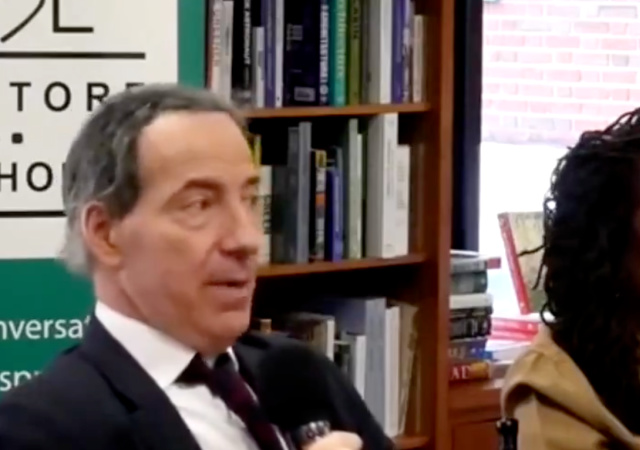Rep. Raskin in February: It’s Up to Congress to Disqualify Trump if He Wins

In February, Rep. Jamie Raskin (D-MD) told a group at the Politics and Prose bookstore in D.C. that if former President Donald Trump wins, Congress must disqualify him on January 6, 2025.
The comment happened before SCOTUS ruled on Trump’s eligibility for the ballot due to his supposed participation in an “insurrection.” Raskin knew the court wouldn’t disqualify Trump.
Raskin insisted that Section 3 of the 14th Amendment should keep Trump off the ballot. Section 3 was meant to prevent Confederates from holding federal office after the Civil War.
SCOTUS reinstated Trump to the Colorado ballot in March in a unanimous decision.
I included the whole video at the bottom of the post. The conversation about January 6, 2025, starts at 58:39.
Here’s the important part:
And the greatest example going on right now before our very eyes is Section 3 of the Fourteenth Amendment, which they’re just disappearing with a magic wand, as if it doesn’t exist, even though it could not be clearer what it’s stating. And so they want to kick it to Congress, so it’s going to be up to us on January 6, 2025, to tell the rampaging Trump mobs that he’s disqualified. And then we need bodyguards for everybody, and civil war conditions, all because the nine justices — not all of them, but these justices who have not many cases to look at every year, not that much work to do, a huge staff, great protection — simply do not want to do their job and interpret what the great Fourteenth Amendment means.
SCOTUS wrote in its decision: “Because the Constitution makes Congress, rather than the States, responsible for enforcing Section 3 against federal officeholders and candidates, we reverse.”
Raskin’s rant included attacks on SCOTUS, claiming the court has been in conservative mode since the Civil War. He even dropped the idea of amending the Constitution to get anything done.
Well, you know, sir, that is possible. It’s tough (on purpose), but it can be done.
Here’s the rest of his rant, which makes no sense at all:
What I would say is, you know, we’ve got to play defense and offense in 2024. The right to vote is under attack in very specific ways in lots of states, especially in some of the Deep South states, especially in Florida, which I just returned from. There’s just unbelievable stuff going on there — like, if you have to send a mail-in ballot or absentee ballot, you have to have a — you can only have it taken to the mailbox or the polls by a member of your nuclear family who lives with you. OK? So there’s just a million traps for the unwary that are being set across the country. But at the same time, we do have to get on offense for the articulation of a constitutional right to vote that’s meaningful for everybody in the country. The million of people who are left out, and disenfranchised, and for everybody whose right to vote is rendered vulnerable by this Supreme Court. And you know, I like very much the point that both Sherlyn [Ifill] and Rick have been making about the Supreme Court. I mean, we’ve got to remember that for the vast majority of American history, the Supreme Court has not been a friend to the people. It has been overwhelmingly in a reactionary or conservative mode, I mean, all the way up until the Civil War. What did the Supreme Court ever do for enslaved people in our country? Absolutely nothing, other than cement their status in the Dred Scott decision, saying that African-Americans had no rights that the white man was bound to respect. And then even after the Civil War, even after the Reconstruction amendments, in 1896 in Plessy v. Ferguson, constitutionalizing Jim Crow. And then it’s not until the Warren Court for a couple of decades, with the white primary cases, and Brown v. Board, where you get a different kind of Supreme Court on the side of the freedoms and equality of the American people. But the court is not going to save us. And so that means the only thing that really works is people in motion amending the Constitution — but again, it’s necessary, but it’s not sufficient, because what can be put in the Constitution can slip away from you very quickly.
You know, if you don’t like the Constitution, then don’t take a job that requires you to uphold the beloved document.
CLICK HERE FOR FULL VERSION OF THIS STORY